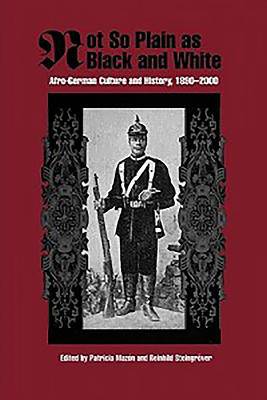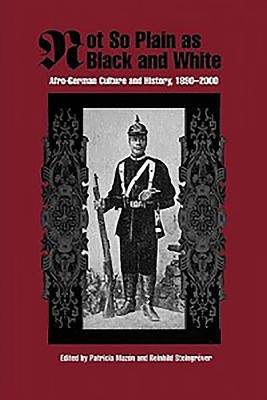
- Afhalen na 1 uur in een winkel met voorraad
- Gratis thuislevering in België vanaf € 30
- Ruim aanbod met 7 miljoen producten
- Afhalen na 1 uur in een winkel met voorraad
- Gratis thuislevering in België vanaf € 30
- Ruim aanbod met 7 miljoen producten
Zoeken
Not So Plain as Black and White
Afro-German Culture and History, 1890-2000
€ 177,45
+ 354 punten
Omschrijving
An exploration of the subject of Afro-Germans, which, in recent years has captured the interest of scholars across the humanities for providing insight into contemporary Germany's transformation into a multicultural society. Since the Middle Ages, Africans have lived in Germany as slaves and scholars, guest workers and refugees. After Germany became a unified nation in 1871, it acquired several African colonies but lost them after World War I. Children born of German mothers and African fathers during the French occupation of Germany were persecuted by the Nazis. After World War II, many children were born to African American GIs stationed in Germany and German mothers. Today there are 500,000 Afro-Germans in Germany out of a population of 80 million. Nevertheless, German society still sees them as "foreigners," assuming they are either African or African American but never German. In recent years, the subject of Afro-Germans has captured the interest of scholars across the humanities for several reasons. Looking at Afro-Germans allows us to see another dimension of the nineteenth- and early twentieth-century ideas of race that led to the Holocaust. Furthermore, the experience of Afro-Germans provides insight into contemporary Germany's transformation, willing or not, into a multicultural society. The volume breaks new ground not onlyby addressing the topic of Afro-Germans but also by combining scholars from many disciplines. Patricia Mazon is Associate Professor in the Department of History at the State University of New York at Buffalo.
Reinhild Steingrover is Assistant Professor in the Department of Humanities at the Eastman School of Music at the University of Rochester.
Reinhild Steingrover is Assistant Professor in the Department of Humanities at the Eastman School of Music at the University of Rochester.
Specificaties
Betrokkenen
- Uitgeverij:
Inhoud
- Aantal bladzijden:
- 266
- Taal:
- Engels
- Reeks:
Eigenschappen
- Productcode (EAN):
- 9781580461832
- Verschijningsdatum:
- 1/03/2005
- Uitvoering:
- Hardcover
- Formaat:
- Genaaid
- Afmetingen:
- 168 mm x 237 mm
- Gewicht:
- 594 g

Alleen bij Standaard Boekhandel
+ 354 punten op je klantenkaart van Standaard Boekhandel
Beoordelingen
We publiceren alleen reviews die voldoen aan de voorwaarden voor reviews. Bekijk onze voorwaarden voor reviews.







